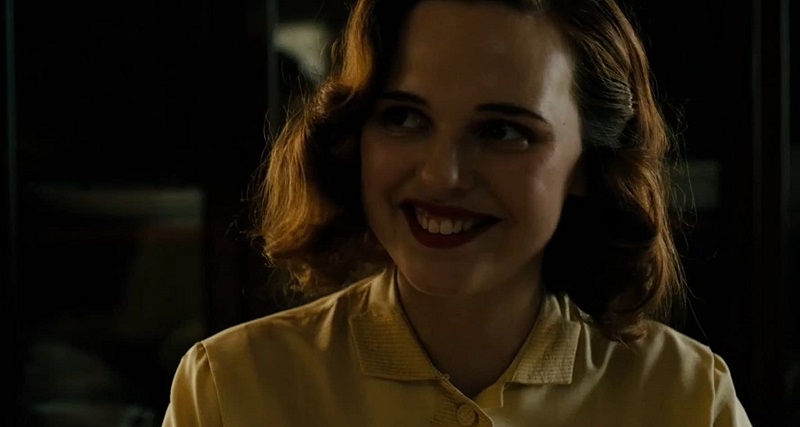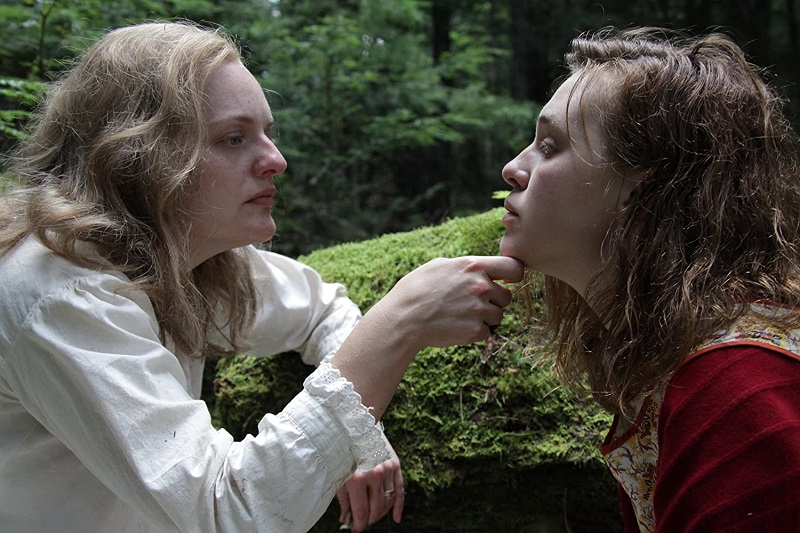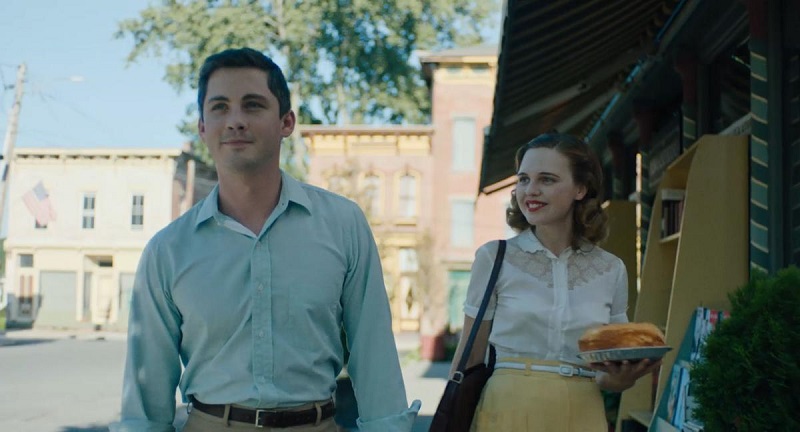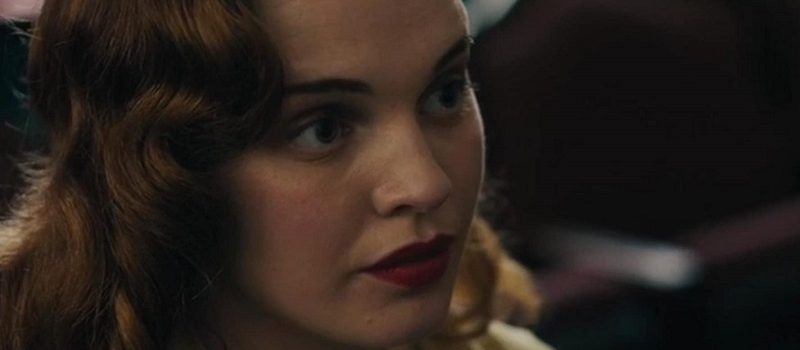Sometimes an actor comes along and captures the zeitgeist in a manner that finds them incapable of missing a single beat. That actress’ moment, right now, is Elisabeth Moss. Previous holders of this flame have included Matthew McConaughey during his “McConaissance” that would conclude with him winning the Oscar for Best Actor for Dallas Buyers’ Club. With the release of Shirley, Moss continues her hot streak that has been subtly brewing for a few years now but has exploded of late with her powerful anchoring of The Handmaiden’s Tale, giving an Oscar-worthy performance in the Blumhouse thriller The Invisible Man and now she has wowed us yet again with an otherworldly turn as famed horror author Shirley Jackson (The Haunting of Hill House). Actress Odessa Young (Assassination Nation, The Stand) got a front-row seat to Hurricane Elisabeth by starring as Rose Nemser, the young wife of aspiring professor Fred Nemser (Logan Lerman).

Young shared priceless amount of screen time with Moss. As portrayed in Shirley, Rose aspired of continuing her education at the southern Vermont university. Upon the Nemsers’ arrival at the home Jackson shares with her husband, Professor Stanley Hyman (portrayed by the always awesome Michael Stuhlbarg), it became clear that in order for the young couple to stay with the professor and his author wife, Rose would need to help out. Dirty plates overrun the kitchen. The house is in dire need of all sorts of help, including shopping for food! By helping Jackson, the two women become close and the friendship even spurs the struggling author to pen prose.
The Australian-born actress phoned The Movie Mensch for an exclusive chat to talk about her Shirley experience, the magnificence of Moss and what it was about this story that most compelled her after first reading the stunning script by Sarah Gubbins.
The Movie Mensch: When heading into this project, did you turn to Susan Scarf Merrell’s 2014 book of the same name as part of the preparation process for filming? Or did you just stick to the script—since that is actually what you were bringing to life?
Odessa Young: I read the novel. But it was pretty clear, even in the first few pages of it, that Sarah Gubbins had taken creative liberties with it—including resetting it in a different time period and conflating some characters. So, after receiving the base level of context and tone, you do just have to work with the text [from] the script.
The Movie Mensch: I was impressed with so much from this picture, but I’m getting to the point with Elizabeth Moss where I her name alone gets me to watch the movie.
Odessa Young: Yeah, absolutely! She elevates everything that she’s in and takes them to new heights.
The Movie Mensch: She sure does.
Odessa Young: It’s pretty incredible.
The Movie Mensch: As a fellow actress, what was your biggest takeaway from the experience of working opposite her?
Odessa Young: There was so much. It is just so exhilarating to a) Watch someone like Lizzie work, watch someone who is so incredibly proficient at their job, and confident, commanding and just has mastered it. She probably thinks that she’s still learning, but G-d, she has mastered it in my eyes. It’s incredible to watch that gift that is completely indescribable. It’s the very reason that I do my job. It’s for moments like that. Moments where you all of a sudden just become completely convinced of the power of acting. It does become kind of a religious experience, to just work with someone who has such a mastery of the craft.
Don’t miss our in-depth Shirley review!
The Movie Mensch: Absolutely. I was struck with the intricate relationships that you possess with each soul that you shared this film. What kind of pre-production work were you able to have? I know a lot of indie films necessarily have time for rehearsals. What were you able to do prior to showing up on set to forge those relationships?

Odessa Young: There was not that much time, because you’re right, we don’t usually get the liberty of too much time. But we did have a few really good and noteworthy rehearsals. For context, Josie (Decker, director), teaches acting as well as being a filmmaker. So, she is very much involved in the rehearsal process and in a pretty exploratory way. One of the first rehearsals that we had with her, aside from the table read, she encouraged us to do certain exercises that open you up. She encouraged us to crawl along the floor, as an animal, while saying our lines, to open up these pathways that, maybe, we were not so willing to go to so quickly. But it really was for the purpose of building trust in each other. That’s the joy of acting. There’s an unshakable bond. Everyone in the cast are just lovely people, and that really helps. It helps when members of your cast and crew are open, and ready to work, and willing to learn, and do not bring your ego to work each day. It’s refreshing to work with people who are there for the job, not just there for themselves. I can say that that’s true of everyone on the set.
The Movie Mensch: As I said, there’s so much to be struck by in Shirley, but I reveled, specifically, in those scenes where the four of you are sitting around the table having dinner or whatever. For you, as an actor, sitting amongst these supreme talents, that must’ve been—not just professionally, but personally—quite uplifting.
Odessa Young: That’s a really beautiful way of describing it! That’s what it felt like. It’s interesting, the script is really often compared to a play and Sarah Gubbins, our writer, has a background in playwriting and writes very theatrically. I think that we approached those scenes, in particular, the dinner scenes, as though we were approaching a play. It’s extremely liberating and daunting to not have, necessarily, action, when you’re just sitting at a table and eating dinner. There’s no real physical work to be done, except to just keep eating your dinner [laughs]. There was so much nuance happening in those scenes. You’re right, sometimes you’d finish a day around the dinner table, and you’d feel completely exhausted—even though you’d been sitting down the entire day! [It’s] just because of that emotional tennis that those scenes felt like and it did feel like magic.

The Movie Mensch: It sure it came across that way. When you first got the script and read it through, what was your initial emotional takeaway from what you’d just read?
Odessa Young: I remember feeling pretty excited because it was one of the most exhilarating or engaging pieces of work about female creativity that I’d read in a really long time. Obviously, being a female creator, seeing those questions and those doubts really explored on the page, it’s the purpose of art, right? It’s the purpose of film. It makes you feel seen. It makes you feel like you are less alone. So, you get that high after reading something like that, with all the ideas of possibilities about where it could go and what it could do. I really think that that is what made the movie so engaging. There was such a beautiful foundation in Sarah Gubbins’ script to dig into. There were these little moments of symbolism, these little metaphors. I don’t want to spoil it too much, but that ambiguity of what is going to happen… what is happening? Who is this? Who are these people turning into? That kind of conference of characters and high emotions is just, especially in a movie about creativity and conjuring a story, is so exhilarating.

